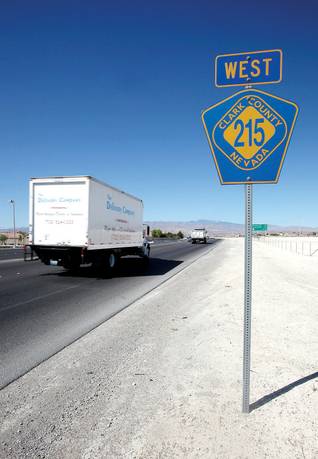
The process of selecting a contractor for the Las Vegas Beltway construction project has been controversial.
Saturday, Jan. 9, 2010 | 2 a.m.
Related document
Related story
- Bids set off 9 months of debate(1-9-2010)
Sun Archives
- Judge orders county to award contract in beltway construction project (1-5-2009)
- County rejects 215 Beltway bids, will start from scratch (11-17-2009)
- Judge denies request to block vote on Beltway project (11-16-2009)
- Judge’s dismissal of 215 Beltway suit paves way for vote (11-3-2009)
- Collins sues county, contractors over alleged ‘secret agreement’ (10-6-2009)
- Law experts baffled by looming deal with paver (9-18-2009)
- 215 Beltway project may be headed for deadlock (9-1-2009)
- Commission to review 215 Beltway bid again, minus two members (8-25-2009)
- Paver learns its skeletons cost it a 215 Beltway job, not record (8-14-2009)
- Judge halts work on 215 Beltway project (8-5-2009)
- Company files new lawsuit over county award of construction job (7-30-2008)
- County reaffirms vote, rejects lowest bid for road project (7-21-2009)
- Judge: Protest of 215 Beltway paving bid too late (6-12-2009)
- Judge upholds temporary restraining order in Beltway paving lawsuit (4-27-2009)
- Company that lost 215 Beltway paving bid sues county (4-23-2009)
- 215 Beltway widening contract sparks controversy (4-21-2009)
- Interchange opens on Lake Mead, 215 Beltway (11-26-2008)
- Road construction continues despite economic downturn (11-21-2008)
U.S. District Judge Robert Jones didn’t just order the Clark County Commission this week to award a lucrative road construction contract to low bidder Fisher Sand & Gravel. He gave the county a severe tongue-lashing, even suggesting that commissioners had acted “corruptly.”
The frustrated judge wrote in his order that “there is more than a hint of favoritism” in the commission’s two decisions last year to award a Las Vegas Beltway project to Las Vegas Paving despite that company’s price being $4.6 million more than Fisher’s.
Las Vegas Paving has a long history of winning many of the road contracts in Southern Nevada. The company is locally owned and a union employer.
Fisher is a subsidiary of a North Dakota-based company and is nonunion.
A transcript of the Tuesday court hearing that preceded his written order notes that Jones said: “Here’s what’s in the back of my head ... illegally (commissioners) were denying this bid because (Fisher’s) not a union shop. We all know that. That’s what was unspoken. Maybe it was spoken at prior hearings. And corruptly they did it.”
Jones did not elaborate on exactly what he meant by “corruptly,” and he did not include the word in his written order.
Commissioners have said they awarded the contract to Las Vegas Paving because they found Fisher was not responsible enough, even though state law calls for such bids to be awarded to the lowest responsible bidder.
Ultimately, however, they decided in November to reject all the bids, and that’s what really ticked off Jones.
Months earlier he had approved an agreement that was intended to resolve the court battle, after he said commissioners had violated Fisher’s right to due process by failing to give the company a chance to defend itself against accusations of tax violations and wrongdoing.
Instead of awarding the bid, however, commissioners tossed out all the bids. Jones called that as an “attempted end-run” around the court-approved agreement.
“I was not kidding, dammit,” Jones told the county’s lawyers at Tuesday’s hearing.
Jones later wrote in his order: “Like a jealous lover who murders the object of his affection so that no one else may have her, the board killed the repaving project, which it had previously determined was needed to serve the people of Las Vegas.”
He also wrote that the commission opted for a way to skirt the court order “out of fear that the ‘wrong’ company may win the bid if it comported with the due process this court demanded.”
During Tuesday’s hearing, Las Vegas attorney Tom Dillard, representing the county, argued that the county had the right to reject all bids. He also defended Commissioner Larry Brown’s motion to reject the bids in the public interest, noting that the county still wanted to do the improvements but was looking at adding an interchange at North Fifth Street as part of a rebidding process.
“If Fisher and Las Vegas Paving deem that they’d like to submit bids on it, by all means do so and let them evaluate,” Dillard said.
Jones was not moved. Rebidding costs companies and county taxpayers, and legal battles are always expensive. In this case, Jones noted that the county could have easily avoided running up the court tab.
But the county may yet incur more costs. Commissioners have yet to decide whether they will accept Jones’ order or appeal it. They are expected to discuss it behind closed doors after their Jan. 19 public meeting.
Fisher attorney Stan Parry of Las Vegas said if the county appeals “we may seek damages and additional sanctions.” He said legal fees from all sides of the case likely have exceeded $1 million.
The Sun asked county spokeswoman Jennifer Knight on Friday to provide an approximate amount of the county’s legal expenses on the case, but she did not.
Jacqueline Byers, research director of the National Association of Counties in Washington, said court orders forcing counties to accept a particular road construction bid are rare.
“A process that allows for the lowest responsible bidder to be selected usually works,” Byers said. “That doesn’t mean you have to take the lowest bidder. But it sounds in this case like the board didn’t follow the court order.”

Join the Discussion:
Check this out for a full explanation of our conversion to the LiveFyre commenting system and instructions on how to sign up for an account.
Full comments policy